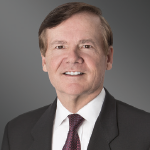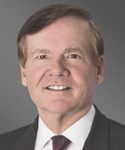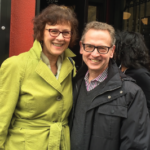SAN DIEGO—Doctors vote less frequently than other professionals, even than farmers, reported Sen. Tim Hutchinson, who is the ACR’s lead lobbyist inside the Beltway, during an Introduction to Advocacy workshop at the 2017 ACR/ARHP Annual Meeting Nov. 3–8.1 Sen. Hutchinson, who represented Arkansas in the U.S. Senate from 1997–2003 and is now a senior director at the law firm, Greenberg Traurig, said he is puzzled why doctors don’t get more involved with politics, volunteering less and making fewer campaign contributions than other groups. Maybe they view politics as disagreeable, he said, but their participation would be welcomed by their representatives, who want to hear about the issues affecting doctors, their practices and their patients.

Sen. Hutchinson
“Voting is the starting point,” he told workshop attendees. “But you need to become engaged. Members of Congress rely on personal relationships with their constituents back home. And lobbying is easier than you might think,” he added. “It doesn’t matter what side you are on politically. Candidates want to hear from you. … They really want to come up with actionable solutions.” Rheumatologists, who can share their professional expertise and personalize the issues from their patients’ experience, would be invaluable resources.
The ACR offers a number of tools and vehicles for its members to get more involved politically, including the Government Affairs Committee, chaired by Angus Worthing, MD, a rheumatologist in practice in Washington, D.C.; RheumPAC, the ACR’s nonpartisan political action committee and voice in Congress; the online Legislative Action Center, with links and templates for sending emails to members of Congress and opportunities to view and search for legislation and get timely updates on current issues; the VoterVoice smartphone app, mobile friendly and obtainable from app stores, which can be personalized by ZIP code and organizational affiliation to help ACR members easily connect with their Congressional representatives; the annual Advocates for Arthritis event, typically held in September—Rheumatic Disease Awareness Month—that brings physicians, patients and other advocates to D.C. for advocacy training by the ACR and subsequent visits to Capitol Hill; and ACR@Work, with twice-monthly policy and legislative updates.
Taking the Social Media Plunge
Increasingly, social media platforms, such as Twitter and Facebook, are being used to send messages to members of Congress, an activity that can require just minutes a day, said Jocelyn Givens, the ACR’s director of public relations. These tools can magnify rheumatologists’ advocacy voices. All senators, virtually all House members, most Congressional committees and their senior staff, federal agencies, political journalists and patient advocates are using social media to broadcast messages and receive input on a variety of topics.2
Ms. Givens said social media platforms are accessible, cost effective, easily shared and able to reach wider audiences with rheumatology messages. “Let us help you sign up. All you need is an email address to get started.” Some doctors expressed concerns about loss of privacy and becoming targets for online confrontations, but Ms. Givens said social media have varied privacy settings. Some participants opt to separate their activities for different purposes, for example, using Twitter for professional communications and Facebook for more private personal messaging.
Recommendations to help you avoid common mistakes:
- Don’t mention fundraising when meeting in the representative’s office to discuss substantive issues;
- Don’t argue, lose your cool or attack anyone’s political beliefs;
- Don’t air personal grievances or appear to be focused merely on self-interest;
- Don’t forget state-level advocacy opportunities, where many important decisions are now being made;
- Don’t forget the “ask”—what you specifically want them to do about the issue that matters to you;
- Always be respectful, and keep your message short and sweet; and
- Remember that posts with photos or videos will be better received.
Get started by sending an email to [email protected].
Larry Beresford is a freelance medical journalist in Oakland, Calif.
References
- Fewer U.S. doctors bother to vote. The Washington Post. 2007 May 18.
- Straus JR, Glassman ME. Social media in Congress: The impact of electronic media in member communications. Congressional Research Service. 2016 May 26.



